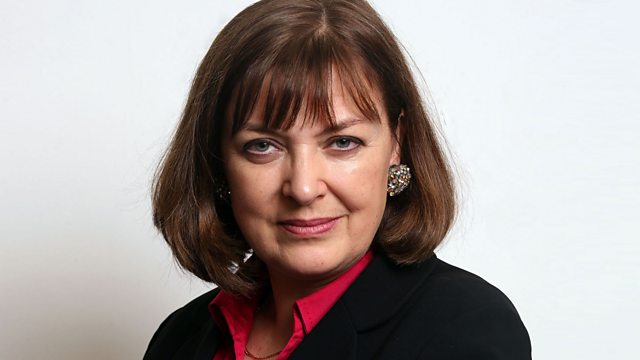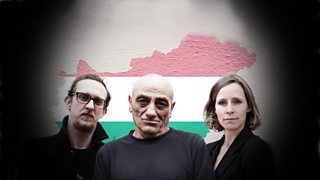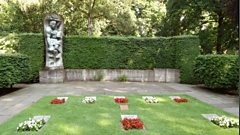
The East German Uprising
On June 17 1953, East German workers went on strike and demanded free elections. Bridget Kendall tells the forgotten story of the first anti-communist revolt of the Cold War.
On June 17 1953, East German workers went on strike and demanded free elections. Within hours, Moscow ordered its tanks to crush the rebellion.
Bridget hears the story of that day, as experienced by a teenage boy, a young worker, a trainee lawyer, an English military driver - and a girl who was looking forward to her seventh birthday party.
With Hardy Firl, George Flint, Carla Ottmann, Joachim Rudolph, Alfred Wegewitz
Producers: Phil Tinline and Sabine Schereck.
Last on
More episodes
Previous
Remembering the 17th June 1953 in Berlin
Sabine Schereck grew up in Berlin and co-produced the Berlin episodes of the Cold War series. Here she reveals how the events covered in the series are still etched into her native city.
On the 17th June 1953 East German workers took to the streets to fight for better conditions in their country. The East German government feared loss of control and had Russian tanks crush the uprising.
The city of West Berlin made sure 17th June 1953 is not forgotten. Just five days after the uprising, a prominent eight-lane street in West Berlin was renamed ‘Street of 17th June’.
Coming from the west, it connects Ernst-Reuter-Square with the Brandenburg Gate.
It’s a poignant connection, considering Ernst Reuter was Berlin’s mayor during the time of the Berlin Blockade in 1948 and had fought for the city’s freedom. The Brandenburg Gate at the other end marked the border between East and West during the Cold War.
It wasn’t only West Berlin that made the effort to remember the uprising. The following year, 1954, West Germany declared 17th June a national bank holiday. It was called ‘Day of German Unity’.
Growing up in 1980s West Berlin, I learned about the uprising at school. However, it was never clear to me what the strike of East German workers had to do with the unity of Germany. The fact that they also demanded Germany’s unity might not have stuck in my mind because in the 1980s the idea of a united Germany was very remote.
When the actual reunification of Germany came about in 1990, the bank holiday on 17th June was taken off the calendar. It’s now on 3rd October, although many Germans are puzzled by that random date.
While the West upheld the memory, in the East 17th June became a taboo subject. It could crop up in job interviews and what you did on that day could make or break your career.
Wilhelm Zaisser, Head of the Stasi since its formation in 1950, lost his post because he had ‘failed’ to see the uprising coming. As a matter of fact, there was not much he could have foreseen. What made the East German Uprising so extraordinary was that it was a rather spontaneous affair. After some construction workers had expressed their discontent with the working conditions on 16th June 1953, the news spread quickly – and on 17th all those who felt similarly discontent made their voices heard across the country and marched through the cities of the GDR.
The GDR at that time believed the uprising was instigated by the West. But after a year-long investigation they couldn’t find any proof of this and had to accept that the East German workers had acted of their own accord.
In the programme Hardy Firl tells us about his involvement in the protest on 17th June, but he also remembers in great detail his time in prison, including how after his three-year sentence was finished he was kept for a further two days. The authorities said his papers had not arrived. Fellow inmates advised him not to bang on the door of the cell to complain, because that would have been regarded as a provocation and he would have risked another sentence.
For Carla Ottmann 17th June did not only mean a disappointing birthday. While her parents were out of the house, she and other children snuck down to the middle promenade where the Russian soldiers were. To her surprise, they were very friendly: they picked her up in their arms, gave the children sweets and sang songs with them. It all seemed very merry and not at all dangerous anymore. When she got home and told her mother, she was scolded terribly.
For some 17th June 1953 was also decisive in a different way. In the programme about The Berlin Blockade, Gisela Bilski tells us about smuggling food from East to West. On the day of the uprising her brother was among the protestors and narrowly escaped being arrested. He then jumped on the next S-Bahn, the overground, and fled to the West. She would not see him for a while as returning to the GDR could mean prison for him, because in 1952 leaving the country without permission had become a criminal offense.
A memorial for the ‘Victims of 17th June 1953’ was erected in 1955 at a cemetery in the district of Wedding. Two years earlier, those who had died in West Berlin hospitals as a result of the uprising had been buried there.
But not only demonstrators who lost their lives in the uprising are honoured. In 1954, at the other end of town, in Nikolassee, close to the former border to East Germany, Russian soldiers were given a memorial too. It is dedicated to those who had refused to crush the uprising.
In 2000 another memorial was unveiled, this time in the former East part of the city. It’s in front of the Ministry of Finance, the former House of the Ministries, where protestors on 17th June 1953 had demanded to speak to the authorities. The building is decorated with a mural from the 1950s, which ironically depicts the ‘Building up of the Republic’ – referring to the GDR.
The collapse of the GDR and the opening of the Stasi archive after 1989 enabled further studies of these events. Many books were published and the significance of that day in German history is re-evaluated, so that now there are discussions about reinstating 17th June as a bank holiday.
Broadcast
- Thu 14 Jul 2016 13:45�鶹�� Radio 4 FM
Foreign Bodies: Keeping the Wolf Out
Podcast
-
![]()
Cold War: Stories from the Big Freeze
Bridget Kendall presents an oral history tracing decisive moments of the Cold War.



